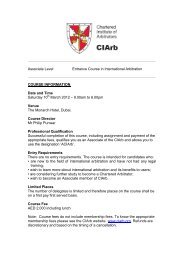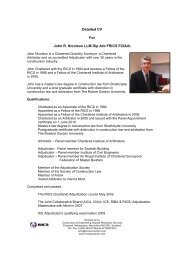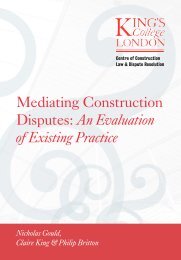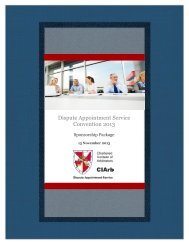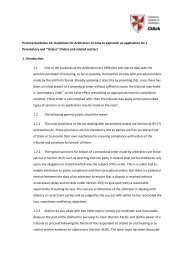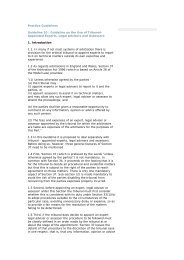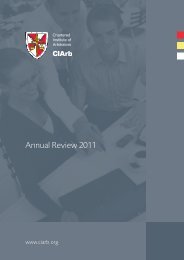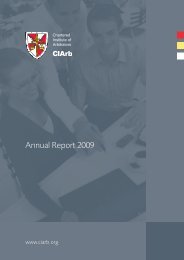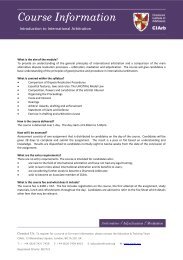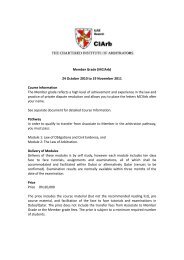Guidelines for arbitrators dealing with jurisdictional problems in ...
Guidelines for arbitrators dealing with jurisdictional problems in ...
Guidelines for arbitrators dealing with jurisdictional problems in ...
Create successful ePaper yourself
Turn your PDF publications into a flip-book with our unique Google optimized e-Paper software.
Practice <strong>Guidel<strong>in</strong>es</strong>Guidel<strong>in</strong>e 11: <strong>Guidel<strong>in</strong>es</strong> <strong>for</strong> <strong>arbitrators</strong> <strong>deal<strong>in</strong>g</strong> <strong>with</strong> <strong>jurisdictional</strong> <strong>problems</strong> <strong>in</strong><strong>in</strong>ternational cases.1. Introduction1.1 We have previously issued guidel<strong>in</strong>es on how to handle <strong>jurisdictional</strong> <strong>problems</strong> thatarise <strong>in</strong> arbitrations tak<strong>in</strong>g place <strong>in</strong> England, Wales and Northern Ireland. These guidel<strong>in</strong>escover the problem from an <strong>in</strong>ternational perspective.1.2 The huge variety of issues that can arise <strong>in</strong> <strong>in</strong>ternational arbitrations make itimpossible to provide def<strong>in</strong>itive guidance to <strong>arbitrators</strong> <strong>deal<strong>in</strong>g</strong> <strong>with</strong> <strong>jurisdictional</strong> <strong>problems</strong><strong>in</strong> such cases. What the <strong>in</strong>ternational arbitrator needs is an awareness of the key po<strong>in</strong>tsthat come up regularly and the basic pr<strong>in</strong>ciples so that he can react <strong>in</strong>telligently whenchallenges to his authority are raised.2. The issues that typically arise2.1 It may be helpful to list at the beg<strong>in</strong>n<strong>in</strong>g some of the most common types of disputethat may be regarded as <strong>jurisdictional</strong>:(1) identity of the parties(2) identity of the contracts governed by the arbitration clause(3) <strong>for</strong>mal validity of the agreement to arbitrate(4) the effect of a problem <strong>with</strong> the ma<strong>in</strong> contract on the validity of the arbitration clause(separability)(5) whether a particular subject-matter can be arbitrated(6) time-limits <strong>for</strong> commenc<strong>in</strong>g proceed<strong>in</strong>gs(7) failure of a condition precedent to the right to arbitrate conta<strong>in</strong>ed perhaps <strong>in</strong> anagreement to mediate <strong>in</strong> advance.(8) whether an arbitrator may apply a law other than the one expressly chosen by theparties(9) whether a particular remedy can be awarded2.2 Jurisdictional issues normally break down uneasily <strong>in</strong>to three categories(1) whether there is a valid agreement to arbitrate at all(2) whether the scope of the agreement covers the dispute and(3) whether the arbitrator has certa<strong>in</strong> powers.2.3 Formal validity and <strong>problems</strong> <strong>with</strong> the ma<strong>in</strong> contract (separability) (issues 3 and 4)probably fall <strong>with</strong><strong>in</strong> the first category. They <strong>in</strong>volve a decision on whether there is a validarbitration agreement. Questions relat<strong>in</strong>g to whether the arbitrator may disregard theparties’ choice of law and whether he can award a particular remedy (issues 8 and 9) come<strong>with</strong><strong>in</strong> the third category. They deal <strong>with</strong> the ambit of the arbitral tribunal’s powers. Theother po<strong>in</strong>ts fit <strong>with</strong><strong>in</strong> the second category. They relate to whether the arbitrationagreement allows the arbitrator to deal <strong>with</strong> the particular dispute and the parties to it.2.4 There are issues that may conta<strong>in</strong> elements of jurisdiction mixed <strong>in</strong> <strong>with</strong> other po<strong>in</strong>ts.For example, <strong>problems</strong> relat<strong>in</strong>g to the constitution of a tribunal are def<strong>in</strong>itely matters ofjurisdiction. An improperly constituted panel does not have jurisdiction to render an award.However, issues of bias more properly belong to other guidel<strong>in</strong>es.2.5 Otherwise, the range of disputes is as wide as <strong>with</strong> domestic arbitrations <strong>with</strong> just agreater range of municipal laws to be concerned <strong>with</strong>.2.6 These guidel<strong>in</strong>es will not deal <strong>with</strong> the law applicable to <strong>jurisdictional</strong> issues which is asubject of its own.3. The Process3.1 AttitudeThe first question that an arbitrator faced <strong>with</strong> a challenge to his jurisdiction must consideris the process by which he is go<strong>in</strong>g to deal <strong>with</strong> the problem. The <strong>in</strong>ternationalization of the
process and the greater risk of cultural clashes make it vital <strong>for</strong> the tribunal to deal calmly<strong>with</strong> the facts and issues. It must not, and must not appear to take the attack on itsauthority personally. The arbitrator must avoid anyth<strong>in</strong>g which may give the impression tothe los<strong>in</strong>g party on the <strong>jurisdictional</strong> issue that he has any bias aga<strong>in</strong>st it.3.2 The arbitrator has the right to rule on his own jurisdictionThe laws of all the important arbitration centres permit the arbitrator to consider achallenge to his own jurisdiction. He does not have to wait <strong>for</strong> a party to br<strong>in</strong>g courtproceed<strong>in</strong>gs. In the western European and UNCITRAL Model law countries considered <strong>in</strong>these guidel<strong>in</strong>es, there is no obligation to wait <strong>for</strong> the court to make up its m<strong>in</strong>d. So, thetribunal faced <strong>with</strong> a challenge to it needs to consider straight away what to do <strong>with</strong> theproblem.3.3 WaiverIn the legal systems considered here, the parties must raise their <strong>jurisdictional</strong> objection<strong>with</strong><strong>in</strong> a reasonable time. For general objections, under Article 16(2) of the UNCITRALModel Law, this must be no later than the submission of the statement of defence.Otherwise, it will have waived the right to object to the step <strong>in</strong> question or to the casebe<strong>in</strong>g dealt <strong>with</strong> at all. In practice, there is considerable divergence <strong>in</strong> the way <strong>in</strong> whichdifferent courts and <strong>arbitrators</strong> <strong>in</strong>terpret certa<strong>in</strong> behaviour <strong>in</strong> this area. The <strong>in</strong>dividual factsof a case can easily sway a tribunal either way. The general test should be whether theparty now seek<strong>in</strong>g to raise the objection has behaved <strong>in</strong> a way <strong>in</strong>consistent <strong>with</strong> theposition that it now wishes to take <strong>in</strong> relation to the po<strong>in</strong>t <strong>in</strong> question.One can argue as to whether there needs to be any reliance on the behaviour by either thearbitrator or the other party. The UNCITRAL approach does not require it. In practice, itwill not be difficult to f<strong>in</strong>d reliance where one party’s behaviour is <strong>in</strong>consistent <strong>with</strong> itsposition on the <strong>jurisdictional</strong> challenge.3.4 Deal<strong>in</strong>g <strong>with</strong> <strong>jurisdictional</strong> issues not raised by the partiesWhere an arbitrator spots a <strong>jurisdictional</strong> problem that the parties have not noticed, thequestion arises as to whether he should take any active steps to draw this to theirattention. In many cases, failure to raise the po<strong>in</strong>t promptly will result <strong>in</strong> its waiver.Bear<strong>in</strong>g <strong>in</strong> m<strong>in</strong>d the fact that the parties have not objected to the arbitrator <strong>deal<strong>in</strong>g</strong> <strong>with</strong>the case or at least not on the grounds <strong>in</strong> question, the arbitrator should normally not raiseissues on his own. This is particularly the case when the tribunal may not know where theparties will have to en<strong>for</strong>ce the award. However, <strong>in</strong> some rare public policy situations, itcan be argued that the arbitrator has an active duty not to deal <strong>with</strong> the case <strong>for</strong> fear ofoffend<strong>in</strong>g local norms. Only then, and if he is confident of the po<strong>in</strong>t’s validity, should heperhaps raise a <strong>jurisdictional</strong> objection.3.5 Agreements about <strong>jurisdictional</strong> issues3.5.1 Increas<strong>in</strong>gly <strong>in</strong> <strong>in</strong>ternational cases, the arbitrator has to issue a rul<strong>in</strong>g on jurisdiction.With different legal cultures <strong>in</strong>volved, it may be vital <strong>for</strong> the arbitrator to obta<strong>in</strong> theparties’ agreement as to the precise scope of the challenge. The use of Terms ofReference, mandatory <strong>in</strong> ICC cases, or a document like it, may be particularly useful here.If signed, even under protest by the object<strong>in</strong>g party, it may reduce the scope <strong>for</strong>challenges not listed <strong>in</strong> the Terms of Reference. For example, an argument about theoverall <strong>for</strong>mal validity of the agreement may be excluded if the challeng<strong>in</strong>g party only<strong>in</strong>dicates <strong>in</strong> the Terms of Reference concerned a general concern about whether one or allof the parties agreed to arbitrate.3.5.2 It is always open to the arbitrator to <strong>in</strong>vite the parties to agree to him resolv<strong>in</strong>g the<strong>jurisdictional</strong> issue. This is a practical solution notably where the rul<strong>in</strong>g on whether there isa contract conta<strong>in</strong><strong>in</strong>g the arbitration clause <strong>in</strong> question may determ<strong>in</strong>e both the<strong>jurisdictional</strong> po<strong>in</strong>t and the outcome of the case. Without the parties’ agreement to submitthe relevant dispute to a panel of the type selected, there does not appear to be any scope<strong>for</strong> <strong>for</strong>c<strong>in</strong>g parties to be bound by the tribunal concerned. This applies even if the partiesappear to have agreed to arbitration under a set of rules which empower the arbitrator to
ule on his own jurisdiction (some recent US case law not<strong>with</strong>stand<strong>in</strong>g). It is always opento the party object<strong>in</strong>g to the arbitrator <strong>deal<strong>in</strong>g</strong> <strong>with</strong> the case to argue be<strong>for</strong>e a court thathe did not validly consent to arbitrate at all or under the relevant rules.3.5.3 An arbitrator sitt<strong>in</strong>g <strong>in</strong> England may consent to a party br<strong>in</strong>g<strong>in</strong>g an application tocourt to resolve the matter. Where a challenge is made <strong>in</strong> good faith and seems to have areasonable prospect of success, there is someth<strong>in</strong>g to be said <strong>for</strong> consent<strong>in</strong>g. Thisconsensual approach is unique to England.3.6 Rul<strong>in</strong>g on jurisdiction: the process3.6.1 More commonly, the arbitrator has to issue a rul<strong>in</strong>g on jurisdiction be<strong>for</strong>e the courtcan <strong>in</strong>tervene directly. The alternative approach, found <strong>in</strong> Sweden and the USA, is that theparties may request the court to make a rul<strong>in</strong>g at any time and regardless of whether thearbitrator agrees to this. Either way, the tribunal might consider it better <strong>for</strong> it to expressan op<strong>in</strong>ion on the po<strong>in</strong>t regardless to allow the court the benefit of its view of the case.3.6.2 The key question is whether to deal <strong>with</strong> jurisdiction separately from substance.There is much to be said <strong>for</strong> the view, expressed <strong>in</strong> Article 186(3) of the Swiss LDIP, thatnormally the arbitrator should deal <strong>with</strong> <strong>jurisdictional</strong> matters separately. It is helpful ifsuch <strong>problems</strong> can be cleared up at an early stage of the process <strong>with</strong> any court challengesbe<strong>in</strong>g concluded be<strong>for</strong>e extensive consideration of the merits. If the tribunal is likely todeclare that it has no jurisdiction over all or part of the case, it is imperative that it rulesswiftly on jurisdiction. It needs to end the <strong>arbitrators</strong>’ consideration of parts of the claimthat fall outside their authority. Delays may also cause an unsuccessful claimant to betime-barred elsewhere. There are, though, exceptions to this, notably:(1) Jurisdiction and substance revolve around the same po<strong>in</strong>t(2) The challenge is made <strong>in</strong> bad faith(3) Delays <strong>in</strong> the local legal system could result <strong>in</strong> the case be<strong>in</strong>g delayed <strong>for</strong> many yearspend<strong>in</strong>g the resolution of any court challenge to the rul<strong>in</strong>g.3.6.3 As seen above, jurisdiction and substance sometimes concern the same po<strong>in</strong>t,notably where the case revolves around whether the parties ever concluded the contract orvalidly assigned it. Normally, <strong>in</strong> such a case, issu<strong>in</strong>g a f<strong>in</strong>al award on jurisdiction andsubstance together makes sense.3.6.4 Otherwise, where the <strong>jurisdictional</strong> challenge appears to be a delay<strong>in</strong>g tactic <strong>with</strong> noprospect of success or there is a risk of delays <strong>with</strong><strong>in</strong> the local court system damag<strong>in</strong>g theproceed<strong>in</strong>gs, the arbitrator should consider a s<strong>in</strong>gle rul<strong>in</strong>g on jurisdiction and substance.3.6.5 When consider<strong>in</strong>g matters of jurisdiction, the tribunal must be careful to observe therules of natural justice and give both parties a reasonable opportunity to present theircase. An <strong>in</strong><strong>for</strong>mal approach has led to challenges to the tribunal’s competence as well as toits actual decision.3.7 The <strong>for</strong>m of a rul<strong>in</strong>g on jurisdiction3.7.1. An issue that can arise relates to the <strong>for</strong>m <strong>in</strong> which the arbitrator’s decision shouldbe delivered. Any rul<strong>in</strong>g aga<strong>in</strong>st jurisdiction may term<strong>in</strong>ate the case and should <strong>in</strong> such asituation clearly be <strong>in</strong> the <strong>for</strong>m of a f<strong>in</strong>al award. It should also cover the tribunal’s fees.3.7.2 A problem arises <strong>with</strong> rul<strong>in</strong>gs that reject <strong>jurisdictional</strong> challenges. Anyth<strong>in</strong>g called an“award” <strong>in</strong> ICC cases must be subject to the approval process of that organization underArticle 21 of that organization’s rules. This can create delays. There is, there<strong>for</strong>e, much tobe said <strong>for</strong> avoid<strong>in</strong>g mak<strong>in</strong>g the decision on jurisdiction <strong>in</strong> that <strong>for</strong>m. Un<strong>for</strong>tunately, it isnot just a question of labell<strong>in</strong>g the rul<strong>in</strong>g “order” or such like. If the arbitrator’s rul<strong>in</strong>gpurports to decide def<strong>in</strong>itively an issue <strong>in</strong> the case, it is an award under certa<strong>in</strong> legalsystems (notably French and Swiss). One solution is to make a rul<strong>in</strong>g giv<strong>in</strong>g reasons butreserv<strong>in</strong>g the tribunal’s right to reach a different decision at a later date <strong>in</strong> theproceed<strong>in</strong>gs. The f<strong>in</strong>al option is just to <strong>in</strong>cur the delays of <strong>in</strong>stitutional approval whilecampaign<strong>in</strong>g <strong>for</strong> the relevant requirements to be relaxed.
3. 8 Stopp<strong>in</strong>g the arbitration to await a court’s rul<strong>in</strong>g3.8.1 When a court is consider<strong>in</strong>g a challenge to his jurisdiction, should the arbitrator stopthe procedure? Normally, aga<strong>in</strong>, the answer depends on the likely success and good faithof the application. If the application seems reasonable, wait<strong>in</strong>g at least <strong>in</strong>itially <strong>for</strong> areasonably prompt rul<strong>in</strong>g can make sense. If not, the arbitrator should usually cont<strong>in</strong>ue toprevent an abusive application to court from delay<strong>in</strong>g the resolution of the matter.3.8.2 Faced <strong>with</strong> a challenge to his authority, the arbitrator must be aware of the seat ofarbitration and its rules govern<strong>in</strong>g the process to adopt. So, <strong>for</strong> example, if sitt<strong>in</strong>g <strong>in</strong> theUSA, he may f<strong>in</strong>d himself or the parties prevented from proceed<strong>in</strong>g by an <strong>in</strong>junctionbrought <strong>in</strong> aid of an application to court <strong>for</strong> a f<strong>in</strong>al order stopp<strong>in</strong>g the arbitration. Failure toobserve this may affect the arbitrator’s ability to complete the case or others <strong>in</strong> the future.3.8.3 However, he may be faced <strong>with</strong> an <strong>in</strong>junction obta<strong>in</strong>ed outside the seat ofarbitration. This may, and usually does, <strong>in</strong>volve the home country of the party object<strong>in</strong>g tojurisdiction. In that case, the arbitrator should normally cont<strong>in</strong>ue <strong>with</strong> the case. Otherwise,the ability of one party to wreck an arbitration merely depends on the compliance of itslocal courts. Anyway, if the parties did agree to arbitrate, they consented to a process <strong>in</strong>the place of arbitration not elsewhere. If the courts <strong>in</strong> the seat are happy <strong>for</strong> the case tocont<strong>in</strong>ue or <strong>in</strong>deed unhappy <strong>for</strong> this to happen, it accords <strong>with</strong> the parties’ agreement andcommonsense to follow their lead.3.8.4 Article 186(1 bis) LDIP (<strong>in</strong> <strong>for</strong>ce from 1 st March 2007) allows <strong>arbitrators</strong> sitt<strong>in</strong>g <strong>in</strong>Switzerland to rule on their own jurisdiction and proceed <strong>with</strong> the arbitration even iflitigation is pend<strong>in</strong>g elsewhere unless there are “serious reasons” to suspend theproceed<strong>in</strong>gs. This effectively removes the possibility that the courts will criticize anarbitrator <strong>in</strong> that country <strong>for</strong> cont<strong>in</strong>u<strong>in</strong>g <strong>with</strong> a case while proceed<strong>in</strong>gs are pend<strong>in</strong>g be<strong>for</strong>e acourt or arbitral tribunal.4. Jurisdictional IssuesThere is <strong>in</strong>creas<strong>in</strong>g convergence between municipal arbitration laws <strong>in</strong> their treatment of<strong>jurisdictional</strong> issues. As a result, many of them can be dealt <strong>with</strong> <strong>in</strong> practice by onlycursory references to municipal law. This is notably the case where the question relates tothe proper construction of the arbitral agreement.4.1 Parties4.1.1 Increas<strong>in</strong>gly, the <strong>in</strong>ternational <strong>arbitrators</strong>’ ma<strong>in</strong> <strong>jurisdictional</strong> task is to decidewhether the actual or prospective participants <strong>in</strong> the case are parties <strong>with</strong> claims under thearbitration agreement. The differences between the approaches to this po<strong>in</strong>t of variouscountries’ legal systems may be more apparent than real. The French courts have made anumber of decisions <strong>in</strong>dicat<strong>in</strong>g a will<strong>in</strong>gness to <strong>in</strong>clude <strong>with</strong><strong>in</strong> an arbitration morecompanies <strong>with</strong><strong>in</strong> a corporate group than are listed <strong>in</strong> the contract, particularly wherethose other entities play a significant role <strong>in</strong> per<strong>for</strong>m<strong>in</strong>g the agreement. This isaccentuated where the <strong>in</strong>volvement of non-signatories was anticipated at the po<strong>in</strong>t of sale.4.1.2 Ostensibly, this appears to be different to the domestic legal positions <strong>in</strong> countrieslike England and Switzerland <strong>with</strong> their apparently stricter approaches to the corporateveil. However, as the French cases <strong>in</strong>dicate, it is a matter of judg<strong>in</strong>g the parties’ <strong>in</strong>tentionsas to who they thought they were contract<strong>in</strong>g <strong>with</strong>. A number of US, Swiss and Englishcourt decisions have shown that concepts of agency or simple construction based on theparties’ <strong>in</strong>tentions can produce similar results to those found <strong>in</strong> France.4.2 Incorporation of arbitration clauses by general reference4.2.1 The English courts have traditionally been more <strong>in</strong>cl<strong>in</strong>ed than most countries topermit the <strong>in</strong>corporation of arbitration clauses <strong>in</strong>corporated by general reference to astandard <strong>for</strong>m agreement.4.2.2 The issues here may be two-fold. First, there is the contractual question of whetherthe parties’ behaviour demonstrated an <strong>in</strong>tention to <strong>in</strong>corporate the second agreement.
Secondly, there can be difficulties <strong>with</strong> the <strong>for</strong>mal validity of the arbitral clause under locallaws and notably Article II (2) of the New York Convention. This requires the agreement toarbitrate to be conta<strong>in</strong>ed either <strong>in</strong> a signed document or an exchange of letters ortelegrams. In recent times, as will be seen, the courts and statutes of major arbitrationcountries have liberalised their rules <strong>in</strong> this area and the Convention represents them<strong>in</strong>imum acceptable standard. Nevertheless, <strong>arbitrators</strong> need to be careful <strong>in</strong> this area.4.2.3 The greater emphasis is on the po<strong>in</strong>t about the parties’ <strong>in</strong>tentions. Not <strong>in</strong>frequently,one f<strong>in</strong>ds a master agreement to which other contracts refer <strong>with</strong> greater or lesser degreesof clarity and <strong>in</strong>corporation. Sometimes, <strong>arbitrators</strong> have to sort out conflict<strong>in</strong>g disputeresolution clauses <strong>in</strong> the different agreements.4.3. Formal validity4.3.1 S<strong>in</strong>ce the 1980s, there has been a general com<strong>in</strong>g together of legal systems on<strong>for</strong>mal validity.4.3.2 One should note, though, that <strong>in</strong> UNCITRAL Model Law countries and states such asBelgium, Holland and Switzerland, one has to be able to f<strong>in</strong>d written evidence of anagreement to arbitrate. An e-mail or fax confirm<strong>in</strong>g an arbitration agreement concludedorally will not on its own constitute a <strong>for</strong>mally valid agreement under these legal systemseven though the underly<strong>in</strong>g contract rema<strong>in</strong>s <strong>in</strong> <strong>for</strong>ce. The Anglo-American approach ofaccept<strong>in</strong>g oral or other types of evidence to <strong>in</strong>dicate an <strong>in</strong>tention to be bound by anarbitration clause <strong>in</strong> writ<strong>in</strong>g is not acceptable <strong>in</strong> those countries.4.3.3 Sweden has no <strong>for</strong>mal validity requirements. Nor does France <strong>for</strong> <strong>in</strong>ternational cases.4.3.4 Whatever the situation, hav<strong>in</strong>g a properly signed agreement to arbitrate either <strong>in</strong> theorig<strong>in</strong>al contract or a subsequent Terms of Reference or submission can facilitateen<strong>for</strong>cement of the award. The New York Convention still permits countries to decl<strong>in</strong>een<strong>for</strong>cement <strong>in</strong> the absence of both parties’ signature or an exchange of letters ortelegrams. The fact that few countries <strong>in</strong>sist on such <strong>for</strong>malities should not bl<strong>in</strong>d thearbitrator to the desirability of a signed document (typically obta<strong>in</strong>ed by ask<strong>in</strong>g the partiesto sign a Terms of Reference). This reduces the scope <strong>for</strong> later disputes.4.4 Separability4.4.1 The <strong>in</strong>ternational arbitrator needs to know that all major arbitration centres applythe pr<strong>in</strong>ciple of separability. This creates a presumption that the agreement to arbitratewill survive any <strong>problems</strong> <strong>with</strong> the validity of the ma<strong>in</strong> contract. If the problem affects thearbitral clause equally, this may <strong>in</strong>validate the arbitration clause. It is <strong>in</strong>sufficient, though,to say the contract is illegal or its <strong>for</strong>mation was affected by fraud. Unless it is argued thatthe arbitral clause suffers from those defects, the challenge must be rejected.4.4.2 Arbitrators should be aware that <strong>in</strong> France and Switzerland, the Supreme Courtshave held that separability does not extend to the situation where it is alleged that theparties did not conclude the underly<strong>in</strong>g agreement, while the Swedish equivalent reachedthe opposite result where the parties had reached agreement on the arbitral clause.4.4.3 Usually, a contract <strong>for</strong>mation problem (but not the failure of a condition precedent )will affect the arbitration clause equally. This is more open to discussion, though, where,dur<strong>in</strong>g negotiations, the parties agreed the arbitration clause but there is a dispute as towhether they reached agreement on the necessary substantive provisions.4.5 Subject-matter arbitrability4.5.1 Subject-matter arbitrability can cause serious <strong>problems</strong> although major arbitrationcentres have made a po<strong>in</strong>t of view of remov<strong>in</strong>g barriers to arbitration of this type over thelast 50 years.4.5.2 For example, it is now clear that an arbitrator can resolve a dispute over whether acontract <strong>in</strong>fr<strong>in</strong>ges the anti-competition provisions of what is now Article 81 (and was Article85) of the Treaty of Rome. The Swiss Tribunal fédéral even requires <strong>arbitrators</strong> to rule on
this <strong>in</strong> cases <strong>in</strong>volv<strong>in</strong>g the European Union’s scope of activities. They cannot, though, givean exemption to the nullity of the contract decreed by the Treaty.4.5.3 It is sometimes argued that patent validity disputes are a matter <strong>for</strong> the exclusivejurisdiction of a court. This argument should almost <strong>in</strong>variably be rejected on the basisthat this refers to rul<strong>in</strong>gs capable of b<strong>in</strong>d<strong>in</strong>g people not party to the arbitration. USlegislation <strong>in</strong> 1983 expressly clarified the arbitrator’s right to rule on patent validity.4.5.4 Bankruptcy is a subject to be handled <strong>with</strong> care and reference to local lawyers. Inpractice, there is no general rule that stops an arbitration <strong>in</strong> the event of a bankruptcy.There are, however, a series of difficult municipal laws which can prevent arbitrationscont<strong>in</strong>u<strong>in</strong>g and may lead to the annulment of an award on public policy grounds. Locallawyers must be consulted if a wasted arbitration is to be avoided.4.6 Time-limits <strong>for</strong> commenc<strong>in</strong>g proceed<strong>in</strong>gsIt is an unusual feature of English law that the court has a limited power to extend time <strong>for</strong>commenc<strong>in</strong>g arbitration. Other major arbitration centres and the UNCITRAL Model Law donot conta<strong>in</strong> any such provision. This may <strong>in</strong>crease the importance of decid<strong>in</strong>g whether alimitation rule affects the tribunal’s jurisdiction or is merely a ground <strong>for</strong> dismiss<strong>in</strong>g theclaim. The US Supreme Court recently followed the majority view <strong>in</strong> England and othermajor arbitration countries by presum<strong>in</strong>g that a limitation rule was not <strong>jurisdictional</strong>.Clearly, though, an arbitration clause can be worded to make the time-limits clearly go tojurisdiction.4.7 Conditions precedent – mediationIt is becom<strong>in</strong>g <strong>in</strong>creas<strong>in</strong>gly common <strong>for</strong> arbitration clause to require the parties to engage<strong>in</strong> a mediation process be<strong>for</strong>e agree<strong>in</strong>g to arbitrate. Recent French Supreme Court andEnglish High Court decisions and an older judgement from the US has favoured theen<strong>for</strong>cement of these clauses. Australian authority favours en<strong>for</strong>cement where themediation process is sufficiently certa<strong>in</strong>, contrast Hooper Bailie Associated Ltd v. NatconGroup Pty Limited (1992) 28 NSWLR 195 at 206 where it was said “What is en<strong>for</strong>ced is notco-operation but participation <strong>in</strong> a process from which co-operation and consent mightcome,” <strong>with</strong> the decision <strong>in</strong> Elizabeth Bay Developments Pty Ltd v. Boral Build<strong>in</strong>g ServicesPty Ltd (1995) 36 NSWLR 709 at 716 where en<strong>for</strong>cement was refused. Section 2A of theHong Kong Arbitration Ord<strong>in</strong>ance requires the courts to take the same view. This approachcan be used to prevent the arbitral tribunal from hav<strong>in</strong>g jurisdiction over a party who failsto co-operate <strong>with</strong> the mediation process.4.8 Disregard<strong>in</strong>g the law applicable to the substance4.8.1 Where the parties have expressly chosen the law to govern the merits of the dispute<strong>in</strong> question, the arbitrator is normally bound to try to apply that law. (The only exception iswhere public policy requires otherwise.) If he fails to do this accurately, that is not amatter of jurisdiction. However, the House of Lords <strong>in</strong> the Lesotho Highlands case wentfurther <strong>in</strong> decid<strong>in</strong>g that a failure to observe the Arbitration Act 1996 when reach<strong>in</strong>g aconclusion on the merits did not constitute an excess of jurisdiction. Its reason<strong>in</strong>gsuggested that so long as the remedy awarded was not excluded by the arbitrationagreement, the arbitrator could not exceed his jurisdiction by reach<strong>in</strong>g a particular resulton the merits. Lord Steyn <strong>in</strong> a part of his judgment <strong>with</strong> which the majority agreed said:“It will be observed that the list of irregularities under section 68 may be divided <strong>in</strong>to thosewhich affect the arbitral procedure, and those which affect the award. But nowhere <strong>in</strong>section 68 is there any h<strong>in</strong>t that a failure by the tribunal to arrive at the “correct decision”could af<strong>for</strong>d a ground <strong>for</strong> challenge under section 68. On the other hand, section 68 has amean<strong>in</strong>gful role to play. An example of an excess of power under section 68(2)(b) may bewhere, <strong>in</strong> conflict <strong>with</strong> an agreement <strong>in</strong> writ<strong>in</strong>g of the parties under section 37, the tribunalappo<strong>in</strong>ted an expert to report to it. At the hear<strong>in</strong>g of the appeal my noble and learnedfriend, Lord Phillips of Worth Matravers MR, also gave the example where an arbitrationagreement expressly permitted only the award of simple <strong>in</strong>terest and the <strong>arbitrators</strong> <strong>in</strong>disregard of the agreement awarded compound <strong>in</strong>terest. There is a close aff<strong>in</strong>ity betweensection 68(2)(b) and section 68(2)(e). The latter provision deals <strong>with</strong> the position when an
arbitral <strong>in</strong>stitution vested by the parties <strong>with</strong> powers <strong>in</strong> relation to the proceed<strong>in</strong>gs or anaward exceeds its powers. The <strong>in</strong>stitution would exceed its power of appo<strong>in</strong>tment byappo<strong>in</strong>t<strong>in</strong>g a tribunal of three persons where the arbitration agreement specified a solearbitrator.”4.8.2. In other parts of Europe, a deliberate failure to apply the law chosen could beregarded as a breach of public policy <strong>in</strong> Switzerland where the courts have repeatedlyreferred to pacta sunt servanda as hav<strong>in</strong>g the <strong>for</strong>ce of ordre public. In France (Art1502(3), Holland (Art. 1065(1)(c), an arbitral tribunal may be held not to have con<strong>for</strong>medto the task entrusted to it and face the sett<strong>in</strong>g aside or refusal to en<strong>for</strong>ce its award. TheBelgian Courts may just take a different approach to Article 1704(2)(d) of their CodeJudiciaire to their English counterparts.4.8.3. In any event, a court review<strong>in</strong>g an award, as part of sett<strong>in</strong>g aside or en<strong>for</strong>cementproceed<strong>in</strong>gs, may always rule that <strong>for</strong> public policy reasons, the arbitrator was right todisapply the law agreed upon by the parties.4.9 Remedies - Punitive Damages4.9.1 One can argue that this has less to do <strong>with</strong> jurisdiction than the limits of thearbitrator’s powers. Such restrictions are themselves “<strong>jurisdictional</strong>”. Anyway, the subjectmatteris <strong>in</strong>extricably l<strong>in</strong>ked to subject-matter arbitrability.4.9.2 While the USA’s federal arbitration act is silent on the issue, Revised Uni<strong>for</strong>mArbitration Act §21(a) provides “[a]n arbitrator may award punitive damages or otherexemplary relief if such an award is authorized by law <strong>in</strong> a civil action <strong>in</strong>volv<strong>in</strong>g the sameclaim and the evidence produced at the hear<strong>in</strong>g justifies the award under the legalstandards otherwise applicable to the claim.” Some states have enacted statutes whichprohibit arbitral tribunals from award<strong>in</strong>g punitive damages, which suggests that suchtopics are not arbitrable <strong>in</strong> those states. There is a question of whether such laws aresubstantive (<strong>in</strong> which case they follow the parties’ choice of law) or procedural (<strong>in</strong> whichthey apply only if the arbitral tribunal is seated <strong>in</strong> that state). However, <strong>in</strong> a case governedby the Federal Arbitration Act where a federal statute mandates an award of punitivedamages, a refusal to make such an award based on state law will almost certa<strong>in</strong>ly result<strong>in</strong> the sett<strong>in</strong>g aside of the award on the basis that the state law prohibition is pre-emptedby a comb<strong>in</strong>ation of the two statutes. This would seem to follow from the Mitsubishi,Mastruobuono and more recent Pacificare Health Systems case. Consequently, anarbitrator sitt<strong>in</strong>g <strong>in</strong> the US probably has to consider award<strong>in</strong>g punitive damages even if thearbitral agreement <strong>in</strong>dicates otherwise where antitrust and RICO claims are raised <strong>in</strong>relation to activities which have a substantial effect on the USA. Otherwise, his awardwould probably be set aside, as a matter of public policy. A tribunal sitt<strong>in</strong>g outside Americamay f<strong>in</strong>d his award unen<strong>for</strong>ceable <strong>in</strong> the US if it fails to give proper consideration to thesetypes of claims.4.9.3 An arbitrator <strong>in</strong> cont<strong>in</strong>ental Europe, where such awards are generally frowned upon,might f<strong>in</strong>d that he has no jurisdiction to make such an award even where the parties haveagreed to apply a US state or federal law to the case. The arbitrator is <strong>in</strong> a difficult positionhere <strong>in</strong> view of the lack of any def<strong>in</strong>itive caselaw on the subject. Even the Swiss Tribunalfédéral has ruled that the tribunal has to resolve a competition law issue raised by one ofthe parties regardless of whether it arose under the law govern<strong>in</strong>g the contract. If <strong>in</strong>doubt, a tribunal might do best to make the award accord<strong>in</strong>g to the applicable law chosenby the parties, make it clear which parts of the award relate to any punitive damageselement and risk partial annulment or limited en<strong>for</strong>cement of the award.5. Conclud<strong>in</strong>g Remarks5.1 There is no fundamental difference between the <strong>jurisdictional</strong> <strong>problems</strong> that arise <strong>in</strong><strong>in</strong>ternational cases from those that come up <strong>in</strong> domestic arbitrations. The arbitrator mustfocus on whether there is a valid agreement to arbitrate at all, whether it covers thedispute and parties <strong>in</strong> question and whether he has the power to act <strong>in</strong> the way <strong>in</strong> whichhe would like to. In resolv<strong>in</strong>g these issues, he must, as always, pay careful attention to thearbitration agreement and the surround<strong>in</strong>g circumstances.
5.2 The difficulty stems from the possible application of legal systems <strong>with</strong> which thearbitrator may not be familiar. He needs to be aware of the possible differences betweendifferent countries’ laws <strong>in</strong> the areas most likely to concern him. There will, though, beoccasions where the very <strong>in</strong>ternational nature of the disputes produces <strong>in</strong>tractabledifficulties. This comes about where different legal systems <strong>with</strong> an <strong>in</strong>terest <strong>in</strong> the caseproduce conflict<strong>in</strong>g outcomes At the same time, the grow<strong>in</strong>g consensus <strong>in</strong> <strong>in</strong>ternationalarbitration statutes and <strong>in</strong>creas<strong>in</strong>g amounts of <strong>in</strong><strong>for</strong>mation available about the differencesshould make the handl<strong>in</strong>g of <strong>jurisdictional</strong> <strong>problems</strong> less challeng<strong>in</strong>g than it has been <strong>in</strong>the past.



